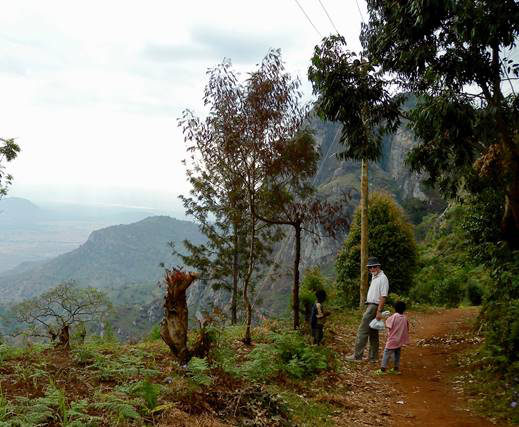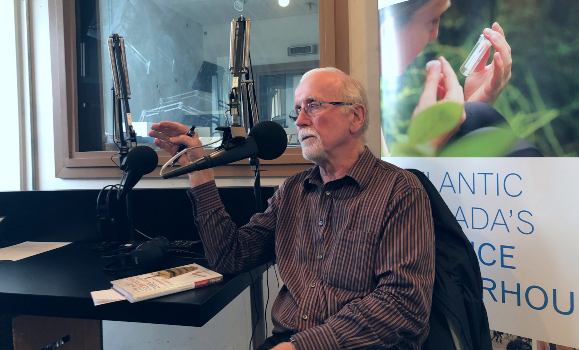 Sciographies is a radio show and podcast about the people who make science happen, brought to you by the Faculty of Science and campus-community radio station CKDU. This article is the fifth in an eight-week series that features excerpts from each new Sciographies episode this fall. You can find Sciographies on Apple and Android podcast apps, by tuning in to CKDU 88.1 FM in Halifax at 4 PM Thursdays (until October 31), or by visiting dal.ca/sciographies or soundcloud.com/sciographies.
Sciographies is a radio show and podcast about the people who make science happen, brought to you by the Faculty of Science and campus-community radio station CKDU. This article is the fifth in an eight-week series that features excerpts from each new Sciographies episode this fall. You can find Sciographies on Apple and Android podcast apps, by tuning in to CKDU 88.1 FM in Halifax at 4 PM Thursdays (until October 31), or by visiting dal.ca/sciographies or soundcloud.com/sciographies.
It was 1966 when Lars Osberg ventured to the other side of the Atlantic for a year abroad. He arrived in London, England after a period of “undergraduate angst” drove him to experience life beyond Ontario. The young Dr. Osberg ended up studying at the London School of Economics, where he learned the value of interdisciplinary thought and discourse.
After completing his undergraduate degree in economics, he spent two years volunteering with Canadian University Service Overseas (CUSO). That brought him to East Africa, where he then worked as an economist with the Tanzania Sisal Corporation for two years. When he returned to North America, he pursued a PhD in development economics at Yale University.
Today Dr. Osberg is the McCulloch Professor of Economics in Dalhousie’s Department of Economics. He has written over 10 books, many of which cover the topic of economic inequality. His most recent is called The Age of Increasing Inequality: The Astonishing Rise of Canada’s 1%. It landed Dr. Osberg the Doug Purvis Memorial Prize for its contribution to Canadian economic policy, awarded by the Canadian Economics Association (which Dr. Osberg once led as the organization’s president in 1999).
In this episode of Sciographies, host and Dal oceanography assistant professor David Barclay interviews Dr. Osberg to learn about economic inequality, insecurity, and well-being — topics that have dominated his distinguished research career. Dr. Osberg also talks about his experiences living and working abroad, and how the field of economics has captivated him for so many years. Here are a few excerpts, edited for length and format.
Dr. Osberg on the itch to go abroad in university…
Barclay: So, you took a liberal arts approach [in university], where you took a little bit of everything?
Osberg: Yes, I did two years at Queen’s and then of course, somewhere around the age 18 or 19, I started thinking seriously about the meaning of life, what’s the purpose of it, what am I doing in Eastern Ontario, can I imagine a life in Eastern Ontario for the next 75 years? And the answer to that is you run screaming from the room, right? [laughs] So, I had this serious spell of undergraduate angst in second year, but fortunately I applied to do a general year abroad at the London School of Economics (LSE) so I did that for my third year.
Barclay: You went to the LSE—obviously a very storied place. That must have been inspiring.
Osberg: It was a fabulous place to go. The British undergraduate culture at the LSE then was a very verbal culture. The idea was that if you’re there, you should be able to talk about mostly anything. You shouldn’t say, oh that’s not my field. You should have opinions, and be able to defend them and talk about them. It was an incredible place for argument and discourse—I learned an enormous amount.

Ten years ago, Dr. Osberg returned to Tanzania while on sabbatical and worked as a research fellow at REPOA (Research on Poverty Alleviation).
Dr. Osberg on the multidimensional nature of economics…
Barclay: You had these very interesting life experiences [LSE, Yale, CUSO in Tanzania]. Would you say they have reflected back on your research?
Osberg: Absolutely. Economics is fascinating on many, many levels. One of the most fascinating aspects to me is that you live in the laboratory. You know, you walk out on the street and talk to people and they’re living in the economy. The changes that you see in front of you day-to-day (in person and in the media); they’re all part of social life. You see it all around you. Another fascinating thing about economics is that things have to add up. There’s a numerical dimension to economics… so, everything can be looked at from these two sides in any point in time.
Dr. Osberg on his latest book, The Age of Increasing Inequality: The Astonishing Rise of Canada’s 1%...
Barclay: …One reviewer wrote: “This book is very depressing but also incredibly hopeful.” I was wondering if you could speak to both sides of that coin. We live in this world and know that inequality is increasing, but there’s also hope in the message somewhere?
Osberg: We live in a human society and human choices can change that society. We have lots of historic examples of both very bad choices and choices that kind of stood the test of time. One of the parallels drawn in the book is that of the 1920s-40s, because the 1920s were a period of rapidly increasing inequality that was followed by the Great Depression. As I argue in the book, one of the consequences of increasing inequality is greater economic instability and the prospect of greater, longer, or more severe recessions and depressions. Those recessions and depressions of the 1930s generated very different political responses in different countries: in Italy and Germany, there was the turn to fascism and Nazism; in the Scandinavian countries, there was a turn to social democracy. The outcome of social stresses is not written in stone. You can say that inequality produces great social stresses, and these produce significant political implications, but it's up to humans to choose which way we go.


